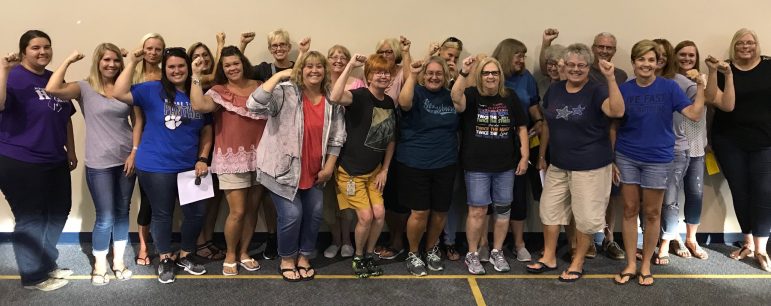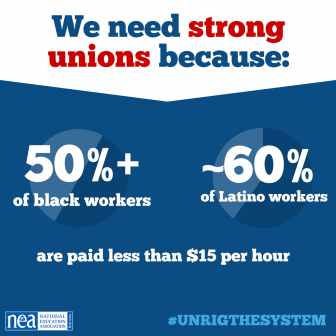Hunger-Free Schools Ohio calls for immediate relief for child hunger crisis
“Every child in Ohio, regardless of where they’re from, what they look like, or how much money their parents make, needs to be able to eat full, nutritionally complete meals at school. Therefore, allowing them to focus on what they’re learning, not on the hunger pangs they’re feeling,” said Ohio Education Association President Scott DiMauro, who hosted Monday’s discussion on behalf of the Hunger-Free Schools Ohio coalition. “Although the pandemic-era federal programs that ensured every Ohio child could receive free meals at school have ended, there is more than enough money in Ohio right now to ensure no student goes without the meals they need.”
“Having meals provided for my child when universal meal programs were in place in Ohio made a huge difference in our lives. Now, every dollar we’re spending on meals is a dollar we can’t spend on the other things we need,” said Megan Thompson, a parent in the Wellington Exempted School District in Lorain County who shared her family’s story during the Hunger-Free Schools Ohio discussion this week.
“Our students are keenly aware of the difference having nutritious school meals makes in their days along with the struggles some of their peers face in trying to pay for those meals,” said Bluffton Middle School Principal Josh Kauffman, whose Allen County students hosted a bake sale to pay off the lunch debts of their classmates. “Unfortunately, there is a stigma around accepting necessary help to access school meals. But that stigma disappears when systems are in place to provide healthy school meals for all.”
“One in six children, and as many as one in four children in certain counties, lives in a household that faces hunger—that’s 413,000 kids across Ohio. School meals play an essential role in alleviating child hunger and improving child wellbeing. We hope lawmakers will prioritize our kids and school nutrition programs in this biennial budget by expanding critical access to school meals,” said Katherine Ungar, a Children’s Defense Fund-Ohio Policy Associate who wrote the “School Meals Support Ohio Student Health and Learning” white paper.
“It has been heartbreaking to see students who are unable to pay for their school lunches turned away from the nutritious food they need. Our dedicated cafeteria staff should never have to serve as both caring food service professionals and hard-hearted debt collectors,” said Daryn Guarino, Director of Food and Nutrition for Alexander Local Schools in Athens County.
“School meals are a basic need for every student to be able to learn and reach their full potential in our classrooms,” agreed Lindy Douglas, Special Programs Coordinator for Alexander Local Schools. “Especially here in rural Appalachia, where our kids already struggle to have a level playing field in so many ways, our kids can’t afford to have our state leaders fail to act on this urgent issue. Ohio lawmakers must act now to make sure every child is fed.”
ABOUT HUNGER-FREE SCHOOLS OHIO
We are a passionate collective representing more than 40 local and statewide anti-hunger, education, food, and nutrition organizations and associations who are working to take hunger off the table, committed to ensuring that every student in Ohio has access to healthy school meals. Learn more at hungerfreeschoolsoh.org
OEA lays out bold vision for 135th General Assembly
“This legislative session presents a tremendous opportunity to address school funding, the educator shortage, the well-being of our students and staff, and other issues that affect our members and the learners we serve,” OEA President Scott DiMauro wrote in a letter to state lawmakers and the governor laying out OEA’s legislative priorities for the 135th General Assembly.
“OEA looks forward to working collaboratively with lawmakers in both chambers and on both sides of the aisle to achieve these important goals for our students and the dedicated teachers, support professionals, and faculty members who work with them every day,” DiMauro said.
Priority education issues for this General Assembly to address include the following:
- Fully funding the Fair School Funding Plan
- Alleviating school staffing shortages
- Ending the expansion of private school voucher programs
- Repealing mandatory student retention under the Third Grade Reading Guarantee
- Supporting student and staff wellbeing
- Protecting the voice of educators by supporting unions and defending collective bargaining rights
More information about each of these legislative priorities can be downloaded here
All in for Ohio Kids responds to Gov. DeWine’s proposed budget
OOC Co-Executive Director Molly Shack, PMO Executive Director Hannah Halbert, OFT President Melissa Cropper, and OEA President Scott DiMauro released the following joint statement:
“No matter where they live or what they look like, all of Ohio’s kids deserve a public school that inspires their creativity, unlocks their potential, and nurtures their dreams. But according to the EdWeek Research Center, Ohio is among the least equitable states for education resource distribution in the country. While we recognize Governor DeWine’s commitment to continuing implementation of the Cupp-Patterson school funding formula, also known as the Fair School Funding Plan, we are calling on Ohio’s lawmakers to take bold action and implement full funding for that plan.
Fully and fairly funding Ohio’s public schools will give school districts a permanent, adequate, stable funding stream that will allow them to make necessary investments to meet the needs of students and address education staffing shortages. Legislators should also avoid competing funding obligations, such as an expansion of private school vouchers or charter schools, that would hinder our ability to fully fund the public schools that 90% of Ohio students attend.
For decades, Ohio policymakers had allowed unconstitutional funding guidelines to determine how resources flow to our public schools. The Fair School Funding Plan created a student-centered school funding formula which put us on the path toward finally meeting our constitutional obligation to Ohio’s students. However, without fully phasing in the necessary funding levels we are still falling short of what our children deserve.
Ohio’s students can’t wait any longer for lawmakers to deliver on the promise of world-class opportunities for all. We urge legislative leaders to finish what they started, refine the components of the school funding formula, and finally dedicate the resources needed for each and every Ohio student to succeed.”
All in for Ohio Kids represents a broad group of concerned organizations and individuals who are working together to fully and fairly fund our schools.
OEA 2022 Election Guide
Members Only
This content is for OEA members only. If you are a member, please click the button below to log in.
If you are a member but haven't registered before, please click here to register.
Ohio Education Association Candidate Recommendations
Ohio’s General Election is on Tuesday, November 5, 2024. Make sure educators voices are heard this November by making your plan to vote. Please see below for some important dates and links for information on voting in the upcoming General Election.
Important Dates
- Monday, October 7, 2024 – Deadline to register to vote and update registrations in advance of the General Election Boards of Election will be open until 9:00 PM for individuals to drop off registrations. See below links for how to check your registration status, register to vote, or update your registration online.
- Tuesday, October 8, 2024 – Early voting for the 2024 General Election begins. See links below for in-person early voting locations, dates, and times.
- Monday, November 4, 2024 – Absentee ballots must be postmarked by this date if returned by mail.
- Tuesday, November 5, 2024 – General Election: Polls are open from 6:30 AM to 7:30 PM and absentee ballots may be returned by 7:30 PM to your Board of Elections if not returned by mail.
Important Links
- To check your registration status, please click here.
- To register or update your registration, please click here.
- To find your county’s early voting location, please click here.
- To find the schedule for early in-person voting, please click here.
- To find out how to request a mail in ballot and vote by mail, please click here.
Click here to look up your current legislative district under the latest state maps.
As part of your voting plan, we urge all OEA members to check out the list of candidates recommended by the OEA members below. Many more candidate recommendations will be made after the Primary, so please continue to check for updates.
It is important to note that OEA members across the state—not OEA staff or leaders—make all the endorsement decisions. In each race, candidates from both parties are asked to fill out questionnaires describing their positions on education issues, and those who are state officeholders are also rated on their education votes in the General Assembly. Candidates are then interviewed by OEA members who work in the district or area in which candidates are seeking office. Based on the candidate’s views on public education issues—and only on public education issues—the OEA Fund State Council and District Screening Committees vote on whether to endorse specific candidates.
You can learn more about the OEA Fund and the screening process here.
**If viewing the recommended candidates list on a mobile phone or small screen, please rotate your device to a horizontal orientation for better viewing.**
| President and Vice-President | Kamala Harris (D)/Tim Walz (D) |
| US Senate | Recommended Candidate |
| US Senate – OH | Sherrod Brown (D) |
| Judicial Seat | |
| Associate Justice of the OH Supreme Court | Melody Stewart (D) |
| Associate Justice of the OH Supreme Court | Michael Donnelly (D) |
| Associate Justice of the OH Supreme Court (Unexpired Term) | Lisa Forbes (D) |
| Ohio House | Recommended Candidate |
| District 1 | Dontavius Jarrells (D) |
| District 2 | Latyna Humphrey (D) |
| District 3 | Ismail Mohamed (D) |
| District 4 | Beryl Brown Piccolantonio (D) |
| District 5 | Meredith Lawson-Rowe (D) |
| District 6 | Christine Cockley (D) |
| District 7 | Allison Russo (D) |
| District 8 | Anita Somani (D) |
| District 9 | Munira Abdullahi (D) |
| District 10 | Mark Sigrist (D) |
| District 11 | Crystal Lett (D) |
| District 12 | Brad Cotton (D) |
| District 13 | Tristan Rader (D) |
| District 14 | Sean Brennan (D) |
| District 15 | Chris Glassburn (D) |
| District 16 | Bride Rose Sweeney (D) |
| District 17 | No Position |
| District 18 | Juanita Brent (D) |
| District 19 | Phil Robinson (D) |
| District 20 | Terrence Upchurch (D) |
| District 21 | Eric Synenberg (D) |
| District 22 | Darnell Brewer (D) |
| District 23 | Daniel Troy (D) |
| District 24 | Dani Isaacsohn (D) |
| District 25 | Cecil Thomas (D) |
| District 26 | Sedrick Denson (D) |
| District 27 | Rachel Baker (D) |
| District 28 | Karen Brownlee (D) |
| District 29 | Cindy Abrams (R) |
| District 30 | Stefanie Hawk (D) |
| District 31 | Bill Roemer (R) |
| District 32 | No Position |
| District 33 | Veronica Sims (D) |
| District 34 | Derrick Hall (D) |
| District 35 | Mark Curits (D) |
| District 36 | No Position |
| District 37 | No Position |
| District 38 | No Position |
| District 39 | No Position |
| District 40 | No Position |
| District 41 | Erika White (D) |
| District 42 | Elgin Rogers, Jr. (D) |
| District 43 | Michele Grim (D) |
| District 44 | David Blythe (D) |
| District 45 | No Position |
| District 46 | Benjamin McCall (D) |
| District 47 | Vanessa Cummings (D) |
| District 48 | Scott Oelslager (R) |
| District 49 | Krista L. Allison (D) |
| District 50 | Matthew Kishman (R) |
| District 51 | No Position |
| District 52 | Gayle Manning (R) |
| District 53 | Joe Miller (D) |
| District 54 | No Position |
| District 55 | Laura Davis (D) |
| District 56 | Cleveland Canova (D) |
| District 57 | Jamie Callender (R) |
| District 58 | Lauren McNally (D) |
| District 59 | No Position |
| District 60 | Rachael Morocco (D) |
| District 61 | David Hagan (D) |
| District 62 | Katie Vockell (D) |
| District 63 | No Position |
| District 64 | Lauren Mathews (D) |
| District 65 | No Position |
| District 66 | No Position |
| District 67 | No Position |
| District 68 | No Position |
| District 69 | Jamie Hough (D) |
| District 70 | No Position |
| District 71 | No Position |
| District 72 | Nathaniel Adams (D) |
| District 73 | No Position |
| District 74 | No Position |
| District 75 | Haraz Ghanbari (R) |
| District 76 | No Position |
| District 77 | No Position |
| District 78 | No Position |
| District 79 | Monica Robb Blasdel (R) |
| District 80 | No Position |
| District 81 | James Hoops (R) |
| District 82 | No Position |
| District 83 | No Position |
| District 84 | Arienne Childrey (D) |
| District 85 | No Position |
| District 86 | Tracy Richardson (R) |
| District 87 | No Position |
| District 88 | No Position |
| District 89 | No Position |
| District 90 | Justin Pizzulli (R) |
| District 91 | No Position |
| District 92 | Mark Johnson (R) |
| District 93 | Jason Stephens (R) |
| District 94 | Wenda Sheard (D) |
| District 95 | Don Jones (R) |
| District 96 | No Position |
| District 97 | No Position |
| District 98 | No Position |
| District 99 | Louis Murphy (D) |
| Ohio Senate | Recommended Candidate |
| District 2 | Paloma De La Fuente (D) |
| District 4 | Thomas Cooke (D) |
| District 6 | Willis Blackshear (D) |
| District 8 | Louis Blessing, III (R) |
| District 10 | Daniel McGregor (D) |
| District 12 | No Position |
| District 14 | Shane Marcum (D) |
| District 16 | Beth Liston (D) |
| District 18 | Katie O’Neill (D) |
| District 20 | No Position |
| District 22 | No Position |
| District 24 | Tom Patton (D) |
| District 26 | Mohamud Juma (D) |
| District 28 | Casey Weinstein (D) |
| District 30 | Iva Faber (D) |
| District 32 | Michael Shrodek (D) |
| District 33 | No Position |
| U.S. Congress | Recommended Candidate |
| District 1 | Greg Landsman (D) |
| District 2 | |
| District 3 | Joyce Beatty (D) |
| District 4 | |
| District 5 | |
| District 6 | |
| District 7 | |
| District 8 | |
| District 9 | Marcy Kaptur (D) |
| District 10 | |
| District 11 | Shontel Brown (D) |
| District 12 | |
| District 13 | Emilia Sykes (D) |
| District 14 | |
| District 15 | Adam Miller (D) |
| State Board of Education | Recommended Candidate |
| SBOE 1 | Kristie Reighard |
| SBOE 5 | Mary Binegar |
| SBOE 6 | Chris Orban |
| SBOE 7 | Rhonda Johnson |
| SBOE 8 | Karen Lloyd |
| SBOE 11 | Delores Ford |
![]()
 Oh Yes, We’re Social — Join the Conversation!
Oh Yes, We’re Social — Join the Conversation!
![]()
Updated September 17, 2024
K-5 License Plate Design Contest
 K-5 “Stop Bullying” License Plate Design Contest
K-5 “Stop Bullying” License Plate Design Contest
Dear Educators,
Ohio Education Association and Ohio Attorney General Dave Yost are partnering to host a “Stop Bullying” License Plate Design Contest for students in grades K-5.
The winning design and slogan will be put on real license plates that Ohio drivers can buy for their vehicles.
To enter, students must create a logo or drawing and can include a short slogan if desired, related to the theme of “Stop Bullying.” Their artwork must be submitted on an official entry form, which is available at the link below.
Entries must be postmarked by May 31, 2019, and sent via U.S. mail to: Ohio Attorney General, Attn: License Plate Contest, 30 E. Broad St., 14th Floor, Columbus, Ohio 43215.
We’re asking for your help. If you are interested in having your students participate, please visit www.OhioAttorneyGeneral.gov/StopBullyingLicensePlateContest to print off copies of the official entry form and to view additional information about contest rules.
We hope you will incorporate contest entries as part of a lesson plan about anti-bullying or use it as a fun end-of -year activity.
However you choose to participate, we are grateful for your help and hope that you and your students find this activity meaningful and enjoyable.
Thank You,
Ohio Attorney General Dave Yost & The Ohio Education Association
Ohio House Bill 70 Hijacked Democracy
OEA Guest Blog | By Jeanne Melvin, OEA-Retired
Academic Distress Commission. School turnaround. The Youngstown Plan. When the state takes over a school district, it may sound promising, but it’s not. Simply put, a state takeover is part of the effort to privatize public education.
School takeovers are undemocratic, unaccountable, and unacceptable.
 Ohio House Bill 70 was originally designed to encourage wraparound community learning centers in lower-performing, high-poverty schools to bring in health clinics, after-school programs, and parent support programs.
Ohio House Bill 70 was originally designed to encourage wraparound community learning centers in lower-performing, high-poverty schools to bring in health clinics, after-school programs, and parent support programs.
The bill easily passed the House and Senate, but an unanticipated 66-page amendment was introduced to establish a state takeover of the Youngstown schools and future takeovers of other school districts with lower test scores. Without a public hearing, the hijacked HB 70 passed the Senate and the House and was sent to the governor and signed into law.
In her book, Reign of Error, Diane Ravitch reveals that corporate reformers want to put education decisions in the hands of powerful executives who are immune to public opinion. School takeovers do just that. Takeover legislation comes from the American Legislative Exchange Council (ALEC), a pro-privatization organization that writes bills to benefit for-profit education companies. HB 70 was copied from a destructive ALEC bill.
School Takeovers Are Undemocratic
HB 70 mandates the appointment of school district CEOs with the power to override the decisions of locally elected school boards. The public-school system’s role is to maintain and strengthen our democracy. In public schools, students learn how to become productive and engaged citizens, and society benefits from the public good of having an educated citizenry. Voters elect local school representatives who will advance their community’s unique perspectives, so it is a vital opportunity to engage in the democratic process.
School Takeovers Are Unaccountable
Youngstown Rep. Michele Lepore-Hagan described HB 70 as “giving an autocratic, unaccountable, appointed CEO total control over every facet of the system. Tear up collective-bargaining agreements. Ignore teachers. Ignore students. Ignore parents. Nearly four years in, here’s what the Youngstown Plan (HB 70) has produced: Ethical lapses. No-bid contracts. Huge salaries for the team of administrators the CEO hired. Concern and anxiety among students, parents and teachers. And the resignation of most of the members of the Distress Commission who were charged with overseeing the CEO.”
School takeovers Are Unacceptable
They infringe on school districts with some of the highest concentrations of low-income minority students in the country. Since 1989, there have been more than 100 takeovers of local school districts in the United States, according to Domingo Morel, author of the book Takeover: Race, Education and American Democracy. In nearly 85 percent of these cases, the districts have been majority African American and Latino. Black communities disproportionately experience the most punitive forms of takeovers, in which elected school boards are disbanded or turned into “advisory” boards. Morel also found that cities with a greater share of black city council members are more likely to face takeovers and concluded that school takeovers are tainted with racism.
Currently, Youngstown, Lorain, and East Cleveland school districts are under state control in Ohio. Dayton schools could be next at the end of this school year. Columbus, Ashtabula, Canton, Euclid, Lima, Mansfield, North College, Painesville, and Toledo public schools face state takeovers after the next school year. If those schools don’t improve under state takeover, they will be turned over to charter school companies.
There IS a better way than school takeovers.
Tell your elected leaders that House Bill 70 must either be repealed or revised to return to its original purpose of providing resources to implement wraparound services.
The time to act is NOW.
Jeanne Melvin’s blog originally appeared in the Spring 2019 Communique, a publication of the Central OEA/NEA
![]()
Click here for more #OverTestedOH & #RedForEd Voices and How to Make a Stand
Blog: The Antidote to Despair
By Julie Rine is an English Instructor and an Academic Challenge Advisor at Minerva High School, Minerva, Ohio.
 It’s easy to feel hopeless and overwhelmed right now, isn’t it? The Supreme Court’s decision regarding the Janus case, while not unexpected, still stung. The move by the Court has the potential to weaken unions, many sources say, and the decision has even been referred to as a “crippling blow” .
It’s easy to feel hopeless and overwhelmed right now, isn’t it? The Supreme Court’s decision regarding the Janus case, while not unexpected, still stung. The move by the Court has the potential to weaken unions, many sources say, and the decision has even been referred to as a “crippling blow” .
There are certain unfortunate situations in life that we can’t control, and it’s important to recognize those and let them go rather than devote energy to a state of affairs that cannot be changed.
There are also situations in life that we CAN impact, with our actions, our words, our advocacy, but even in those situations, there are moments when you have to let go, politically, personally, emotionally. You have to take a break, look away, check out, turn off the news and turn on a Friends rerun, lose yourself in a good book, take a few deep breaths and decide to let go and let someone else take up the cause for awhile. Those “let go” moments are critical to maintaining good mental health and restoring energy to jump back into the fray when we are refreshed and ready to go.
But this is not one of those times. This is not a “let go” moment. This is a “Let’s Go” moment.
The media would have you believe that the Janus ruling will lead to fewer union members which means a reduction in funds which equals unions cutting jobs and services and benefits. If you believe the news, soon our teacher unions will be so weak and ineffective that teachers will not be able to influence an impressionable kindergartner, let alone legislative policies.
Don’t believe the hype.
If anyone is equipped to turn a bad roll of the dice into an opportunity to change the game, it’s teachers.
On a daily and weekly basis, we think on our feet, we adapt to a snag in the routine. We reflect on what worked and what didn’t and make adjustments in the three minutes between classes, a task that would take Congress three months. We take on whatever challenges exist in our communities and in our classrooms and we overcome them. We don’t stop there, either. Most of the time, we not only overcome the challenges we face, challenges which can change from year to year and week to week, (sometimes even minute to minute!), we create new programs, new methods, and new realities that are often more effective for our students than what existed before the obstacle presented itself.
I don’t care what your political leanings are, if you are a teacher, you rival only parents in your fierce desire to protect kids and prepare them to succeed in the future.
The union helps us do just that. Through the union, we can fight for what our kids need to succeed, such as smaller class sizes, adequate and up-to-date academic resources, onsite counselors and mental health professionals, and a safe environment in which to learn. The union also helps us fight for what teachers need to help students succeed, such as adequate planning time, meaningful professional development, continued opportunities for further education and training, sufficient time to work as teams to tackle problems rather than as isolated instructors behind our classroom doors, and yes, a fair salary which allows us to focus fully on our students and our own families instead of squeezing in hours away from both while we work a second job to make ends meet. The trickle-down effect here is obvious; when teachers lack support and resources, kids lose the effective education they deserve.
So what can we do?
The decision will not be reversed, and even worse, it appears that a new Justice will be seated who may have equally damaging views of unions and public education.
First, we must remember that Supreme Court Justices are not the only ones allowed to issue opinions. We can write letters to the editor of our local papers, and we can routinely call or write our elected officials to make our voices heard and our opinions known.
Secondly, we can actively recruit members, especially young teachers, to not only join the union, but to become active in the union. Retaining or gaining members will of course help the union financially, since our dues dollars provide us with the resources and training necessary to be effective advocates for our students. But we don’t just need the dues money. We need active and energetic members, more than ever before. Money talks, but members act.
Thirdly, we can help register new voters. If we want a future in which citizens are active participants in the democratic process (whether they are on “our side” or not), then we must emphasize the importance and value of our right to vote, and then take the practical step to register young voters. It is a simple process. There is no reason why every 18-year-old student who graduates from an American high school should not be registered to vote.
 We can’t force them to register, however, so the goal should be to get them excited to register.
We can’t force them to register, however, so the goal should be to get them excited to register.
By teaching our students how to read a variety of sources on any given topic and then to form their own opinion, we help them become critical thinkers. Critical thinkers are often eager to make their positions known, and the most powerful way to do that is to exercise the right to vote. Few moments of my teaching career have been as special to me as when I registered a student to vote and she literally high-fived me and yelled, “I can vote, I can vote!” This is the enthusiasm we must seek to engender in our classrooms.
Perhaps most importantly, we can get involved in local and OEA efforts to elect pro-public education and pro-union candidates. We can work phone banks, canvass door-to-door, talk to our colleagues and friends about why we support certain candidates. We must follow that up by voting for candidates who support us as public school teachers and as union members, up and down the ballot, in local elections, in primaries, in midterms and in presidential elections. These actions are particularly important in Ohio this year, as we will be voting for a senator and a governor.
Political defeats can be discouraging, but nothing feels worse than knowing you could have done more to ensure victory when instead you chose to sit on the sidelines. We must take our frustration and allow it to motivate us to take action.
Sure, the Supreme Court decision is a setback, a challenge to be overcome. But a “blow” to unions? I don’t think so. In fact, I think they might have just poked the beast. Joan Baez said “Action is the only antidote to despair.” So don’t despair. Don’t make this a “let go” moment. This is a “LET’S GO!” moment and I have no doubt that we will persevere and succeed. The teachers’ unions are strong because teachers are strong, and we are stronger when we stand together, as friends, as colleagues, and as proud union members.
![]()
— Julie Rine is an English Instructor and an Academic Challenge Advisor at Minerva High School, Minerva, Ohio.
Maysville Schools’ Support Professionals Vote to Unionize, Join OEA

(Dec. 18, 2018) | For Immediate Release | Contact: Gabriel Weatherspoon Jr. | 740 624-3905
Confirmed by an official ballot count by the State Employment Relations Board, nearly 100 nonunion education support professionals of the Maysville Local School District voted to become an affiliate of the Ohio Education Association (OEA). The Maysville Local School District is located in Muskingum County, near Zanesville.
These education support professionals, which include school bus drivers, custodians, aides, paraprofessionals, secretaries, as well as food service workers will be collectively known as the Maysville Classified Employees Association (MCEA).
“Our primary reason for organizing is to secure fair working standards across the district,” said MCEA spokesperson Gabriel Weatherspoon.
“Regardless of position or title, we ALL deserve to be heard at work and be treated with dignity.”
Emphasizing the role that everyone has in maintaining a safe and robust learning environment for Maysville students, Weatherspoon added: “Regardless of position or title, we ALL deserve to be heard at work and be treated with dignity.”
Similarly, since 1991, the OEA has represented the professional interest of the school district’s approximately 140 teachers and similar certified staff members as the Maysville Education Association.
Today’s vote was the culmination of a months-long organizing campaign.
The Maysville Classified Education Association will now begin the process of negotiating its initial contract with the Maysville Local School Board
“We are looking forward to sitting down with the district and discussing a fair and equitable contract that benefits not only the Maysville classified staff, but also the students we work with every day,” said MCEA Organizing Chair Tammy Smith
![]()
Pictured Below: The Newly Formed Maysville Classified Education Association
• Front, l-r: Mitzi Farmer; Trisha Winland; & Melissa Spring.
• Back: l-r: Robin Windsor; Barb Handshy; Tammy Smith, Organizing Chair; Gabe Weatherspoon, MCEA spokesperson; & Beth McGee

![]()
You Cannot Silence the Voice of Working People

Teaching children is pretty wonderful.
This has been my passion and in the 19 years that I taught, I learned from and have been inspired by my colleagues. I have also been moved by the actions of fellow union members who fought for better wages and safe working conditions.
The energy we are seeing with teachers standing up in the neighboring states of West Virginia and Kentucky and elsewhere as the #RedForEd movement spreads across the country is unparalleled in recent history. Public opinion is with us. A recent poll found that 62% of Americans believe the country is better off with stronger unions.
Yet, while this happening, amid the highest level of support for unions in 15 years, the US Supreme Court in a narrow 5-4, politically-motivated decision ruled that unions – specifically public employee unions — should be weaker. The Supreme Court ruled in the case of Janus v. AFSCME, Council 31 to further tilt the playing field in favor of the wealthy and corporate interests.
The court overturned 40 years of precedent in deciding that requiring so-called fair-share fees to be paid by people who choose not to join a public-sector union but who enjoy the benefits of union representation somehow violates the First Amendment of the Constitution. This doesn’t make sense, and it’s not right.
It also doesn’t make sense that so many people are finding it difficult to get by and provide for their families, no matter how hard they work. It doesn’t make sense that people are more productive than ever, but they’re working longer hours for less money and fewer benefits. And it doesn’t make sense that all this is going on while a handful of very wealthy people have seen their salaries and holdings skyrocket. It is shameful that the wealthy special interests behind the Janus case have succeeded in manipulating the highest court in the land to do their bidding.
"I believe deeply in the power of our collective voice to make sure that every teacher and student has the resources they need to be successful."

I believe deeply in the power of our collective voice to make sure that every teacher and student has the resources they need to be successful. When unions negotiate for working conditions in the classroom, they also negotiate for the conditions in which our children learn. When our unions advocate for us as educators, they also advocate for the students we serve.
Public service workers-teachers, social workers, firefighters, and nurses are more determined than ever to stick together in their unions. Unions remain the most effective vehicle for the power in numbers needed for working people to secure their rights and freedoms, and they provide a pathway to the middle class.
The truth is, when unions are strong, the entire community benefits. Unions use their collective voice to advocate for policies that help all working people — like increases to the minimum wage, affordable health care and great public schools.
Unions help close the pay gap for women and communities of color who have been systematically disadvantaged due to discrimination and prejudice.
African-American women in unions earn an average of $21.90 per hour, while non-union women earn $17.04. When Latinos are members of a union, their median weekly income increases by more than 38 percent.
The wealthy special interests that have benefited from an unfair, unbalanced playing field are now intent on tilting that playing field even more by attacking public-sector unions.
It’s driven by ideological extremists who oppose our basic right to organize. And it’s an attack on more than the men and women who are teachers and custodians and first responders; it’s an attack on anyone who wants to use their voice to fight for something better for their communities.
I have dedicated my life both to helping students and fighting for my community and I won’t back down.
My fellow educators and I are going to continue to speak out and I ask those who feel the same, please join us. Because no great social change — from ending slavery to securing the right to vote for every citizen, to winning the freedom to organize — has been achieved by standing alone.

Becky Higgins
President
Ohio Education Association
Categories
2018 Press ReleasesAbout Voices of Change
Education Support Professional
Higher Education Faculty
Higher Education Staff
Legislative Issues and Political Action
Local Leader
Member Stories
Membership
New Teacher
Non-educator
OEA Member
preK-12 Teacher
Retired Member
Student Member
What's New



